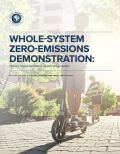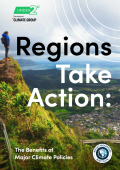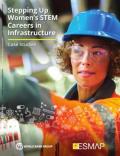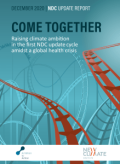
This report introduces a new concept — Whole-System Zero-Emissions Demonstration (WS-ZED). The WS-ZED concept goes one step further than net-zero carbon and proposes a broader concept to reveal the added value of synergy among net-zero carbon, net-zero waste, and net-zero pollution. This new concept aims to resolve these growth challenges by adopting a holistic approach to put in place urban management policies to combat both climate change and environmental degradation.

This handbook shows how regional governments are reaping the immediate benefits of decisive climate action while also safeguarding the future. For these governments, a collection of key actions is driving significant impacts on the economy, equity, public health, air quality, and resilience. The handbook details five transformative actions regional governments can take to limit the effects of climate change while supporting a broad range of other societal benefits.

This report describes a variety of ways to level the pathway for women entering into and progressing in science, technology, engineering, and mathematics (STEM) employment within the infrastructure sectors—energy and extractives; water; transport; and digital development.
Volume 1 distills the findings from an extensive literature review, a global stocktaking exercise, key informant interviews, and five case studies in order to provide World Bank Group project teams with insights that they can use to support women’s STEM careers in infrastructure at each stage of their careers—from initial attraction to the sectors and job recruitment, to retention within organizations, and advancement to managerial and leadership roles.
Come Together - Raising climate ambition in the first NDC update cycle amidst a global health crisis

The 2020 NDC Update report discusses countries’ preparedness to ratchet up ambition in the first NDC update cycle amidst a global health crisis. It discusses the progress of NDC implementation since 2015, expectations for the NDC update cycle, progress on the development of LTSs, and the potential impact of COVID-19 on climate planning.
The Kigali Cooling Efficiency Program (K-CEP), a philanthropic collaboration active in over 50 countries, has identified six high-impact opportunities that can reduce emissions, increase job creation, and enhance economic output through the inclusion of efficient, climate-friendly cooling in stimulus packages.
